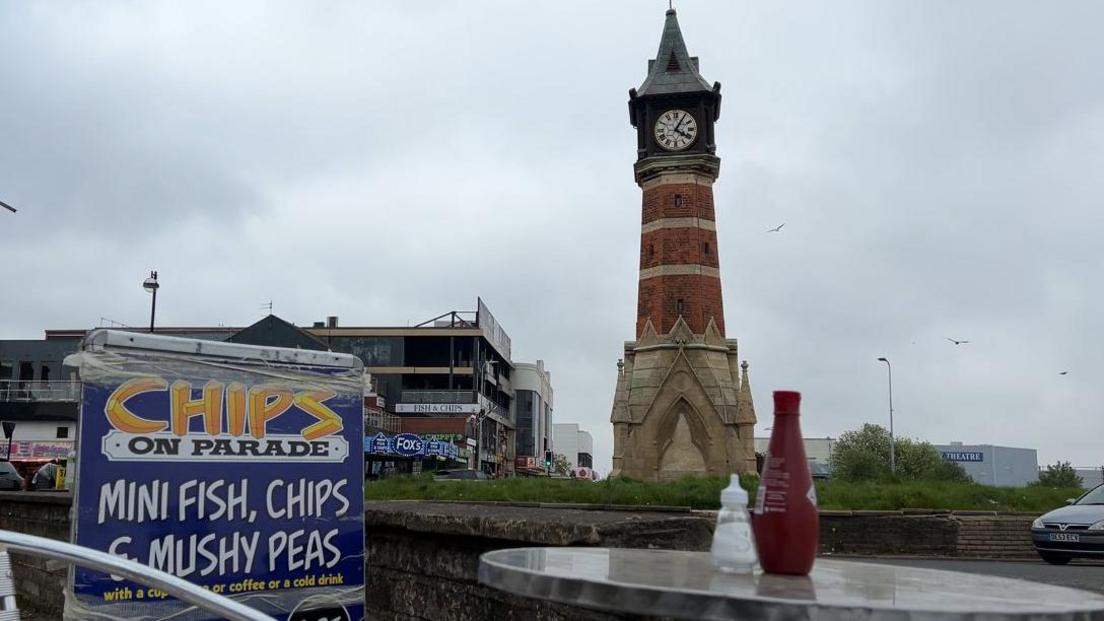'It's all on a plate' - Skegness obesity concerns

Statistics show adults living in East Lindsey die between seven to 10 years earlier compared to the rest of the country
- Published
Doughnuts, ice cream and fish and chips are argued by many to be seaside staples. But in the Lincolnshire town of Skegness residents say it is time for a new menu.
It comes as statistics by Public Health England show there is a lower life expectancy on average for people living in East Lindsey.
BBC News spoke to a concerned local gym owner who says he has seen the impact of high-fat foods first-hand.
As the music in the boxing gym reverberates from wall to wall, owner Ross Flay is standing under the hazy lights, deep in thought.
Every few seconds a loud thud can be heard as people passionately whack punching bags swinging before them.
A frown creeps across his face as he admits an influx of people have been needing his help when asked to pinpoint what has changed since he started the SFK gym 20 years ago.
“We have seen more and more people with weight issues,” he explains.
“There’s access to food that will not benefit you and that’s what we’re up against in Skegness.”

Ross Flay says being healthy mainly revolves around a good diet
Data released in October last year , externalby the NHS shows 20% of 10 and 11 year olds in the East Lindsey district are obese.
For Ross, these statistics are a stark warning: “The way unhealthy food is accessible to children in Skegness isn’t right," he says.

Daniel Vaughan thinks Skegness doesn't have enough healthy options
Across the room, 31-year-old Daniel removes his boxing gloves and sits down, covered in sweat.
“I’ve lost 37kg”, he says with a proud smile. It's a smile that never wavers during the conversation.
He thinks he gained the weight as a direct consequence of poor food options in Skegness.
“Everyone comes to here for fish and chips and doughnuts, and that was me a couple of years ago. It's all on a plate, literally, ready for you.”
A report published in 2016 by Public Health England shows life expectancy is 10.3 years lower for men living in the district of East Lindsey.
It's 7.2 years lower for women.
A spokesperson from East Lindsey District Council said: "Whilst there are no council-specific policies in place regarding planning applications for takeaways or hot food outlets, all applications are thoroughly assessed and considered, and decisions made according to the nationally set guidelines and powers available."

Fish and chips at the seaside have been a popular choice of food for many years
Alfred Slade, from the Obesity Health Alliance, says Public Health England’s data comes as no shock.
“Seaside towns and areas of high deprivation have much higher rates of obesity,” he explains.
“Four out of five billboard adverts in outdoor areas are in the country's most deprived areas,” he states.
“It is a predatory marketing tactic."
Back at the gym, Ross is weaving in-between the crowd of people shadowboxing amongst themselves.
The crowd is made up of a mixture of ages, the youngest around 16, the oldest in his 50s.
Ross admits there is no quick solution to his concerns.
“If you go into a convenience garage in Skegness, you’ll see energy drinks and chocolate bars,” he explains.
“Part of the solution is changing this, so we all access better foods.”
Ross's face changes again, looking upwards before carrying on.
“But it isn’t just the person’s responsibility it also lies with big co-operate companies, too,” he adds.
BBC Politics North on BBC One on Sunday at 10:00 BST comes from Skegness and Boston.
Follow BBC Lincolnshire on Facebook, X (formerly Twitter), external, and Instagram. Send your story ideas to eastyorkslincs, external
More news from Skegness
- Published13 June 2024

- Published11 June 2024

- Published12 June 2024
